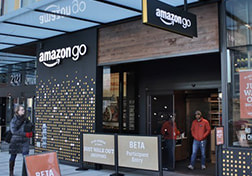
WASHINGTON - In a move that could revolutionize the way we buy groceries, Amazon opens its first supermarket without checkouts -- human or self-service -- to shoppers on Monday. Amazon Go, in Seattle in the US, has been tested by staff for the past year, BBC reported. It uses an array of ceiling-mounted cameras to identify each customer and track what items they select, eliminating the need for billing.

Purchases are billed to customers' credit cards when they leave the store. Before entering, shoppers must scan the Amazon Go smartphone app. Sensors on the shelves add items to the bill as customers pick them up - and deletes any they put back. The store opened to employees of the online retail giant in December 2016 and had been expected to allow the public in more quickly.
But there were some teething problems with correctly identifying shoppers of similar body types - and children moving items to the wrong places on shelves, according to an Amazon insider.
Gianna Puerini, head of Amazon Go, said the store had operated well during the test phase: "This technology didn't exist -- it was really advancing the state of the art of computer vision and machine learning."
Amazon has not said if it will be opening more Go stores, which are separate from the Whole Foods chain that it bought last year for $13.7 billion. As yet the company has no plans to introduce the technology to the hundreds of Whole Foods stores. However, retailers know that the faster customers can make their purchases, the more likely they are to return. Making the dreaded supermarket queue a thing of the past will give any retailer a huge advantage over its competitors.
The Seattle store is not Amazon's first foray into bricks and mortar retailing, however. In 2015 the firm opened its first physical bookshop, also in Seattle where the company is based. There are now about 12 in the US -- including one in New York that opened last year -- as well as dozens of temporary pop-up outlets.
In its third quarter results in October, Amazon for the first time put a figure on the revenues generated by its physical stores -- $1.28 billion. Yet almost all of that was generated by Whole Foods. While its stores may not yet be moneyspinners, analysts have said Amazon is using them to raise brand awareness and promote its Prime membership scheme. Prime members pay online prices at its bookstores, for example, while non-members are charged the cover price.
Brian Olsavsky, Amazon chief financial officer, recently hinted that rivals should expect more Amazon shops in the months and years ahead. "You will see more expansion from us - it's still early, so those plans will develop over time," he said in October.
But there were some teething problems with correctly identifying shoppers of similar body types - and children moving items to the wrong places on shelves, according to an Amazon insider.
Gianna Puerini, head of Amazon Go, said the store had operated well during the test phase: "This technology didn't exist -- it was really advancing the state of the art of computer vision and machine learning."
Amazon has not said if it will be opening more Go stores, which are separate from the Whole Foods chain that it bought last year for $13.7 billion. As yet the company has no plans to introduce the technology to the hundreds of Whole Foods stores. However, retailers know that the faster customers can make their purchases, the more likely they are to return. Making the dreaded supermarket queue a thing of the past will give any retailer a huge advantage over its competitors.
The Seattle store is not Amazon's first foray into bricks and mortar retailing, however. In 2015 the firm opened its first physical bookshop, also in Seattle where the company is based. There are now about 12 in the US -- including one in New York that opened last year -- as well as dozens of temporary pop-up outlets.
In its third quarter results in October, Amazon for the first time put a figure on the revenues generated by its physical stores -- $1.28 billion. Yet almost all of that was generated by Whole Foods. While its stores may not yet be moneyspinners, analysts have said Amazon is using them to raise brand awareness and promote its Prime membership scheme. Prime members pay online prices at its bookstores, for example, while non-members are charged the cover price.
Brian Olsavsky, Amazon chief financial officer, recently hinted that rivals should expect more Amazon shops in the months and years ahead. "You will see more expansion from us - it's still early, so those plans will develop over time," he said in October.

 RSS Feed
RSS Feed
